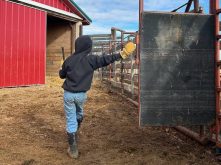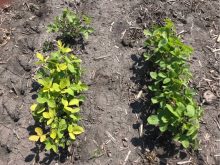As part of her Grade 3 Green Team science project at Dundonald School in Saskatoon a couple of years ago, Dr. Debbie Miket helped her students plan and plant a small vegetable garden.
“A friend told me she wouldn’t be using a portion of her garden plot, so I asked if our Green Team could grow a garden in her backyard. She agreed,” Miket said.
The Green Team consists of several participants from each grade at the school. In May, they prepared the garden area during their lunch hour. The Grade 8 students dug up quack grass while Miket helped the younger students pull out the roots. She could only involve four at a time, but in total, about 25 students had a chance to take part in the project.
Read Also

Maintain motion to ease joint stiffness
As we proceed into colder, drier temperatures, it’s common to hear reports of more joint stiffness and pain, athletic therapist Kathlyn Hossack writes.
Once the area was cleared of grass, the students could begin to plan the layout. They planted spinach, lettuce, carrots, beets, potatoes, squash and pumpkins. Volunteer cantaloupe from the owner’s compost also germinated and grew. “We all had a wonderful time and the children were so enthusiastic and eager to help. One student told me he wanted to be a gardener and brought his own tools and seeds. We also had lots of parental support, sending seeds and offering transportation.”
- From the Manitoba Co-operator: Gardens and green lunches shine a light on two rural schools
Students wrote about their gardening experiences, and Erica Deans said, “This garden had beautiful sunflowers in it. The garden was special to me because the plants and flowers made me happy. I liked picking pumpkins and potatoes. It was neat to see cantaloupe on a plant. My grandpapa is a farmer so I’m used to gardening and harvesting. That is special to me! I was so happy that I got picked to go to the garden!”
Julius Newell-Silva wrote, “I think it is important because it helps nature. It is good for the environment. It gives us food, makes us healthy and strong, and teaches us patience.” Children who learn to respect their environment and the earth when they’re young will likely have a deeper appreciation for the need for responsible stewardship as they get older. “I feel being part of a project like this in their formative years helps them in bonding with the earth, and they learn where their food comes from,” Miket said.
There was less student involvement in the garden during the summer holidays, but in the fall the Green Team harvested the produce, prepared a luncheon and everyone enjoyed the fruits of their labour. “They were very excited at the results,” Miket said.
Dr. Debbie Miket can be reached at [email protected].















